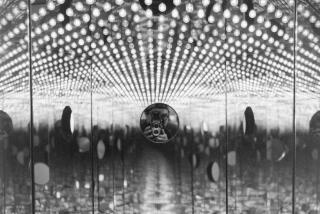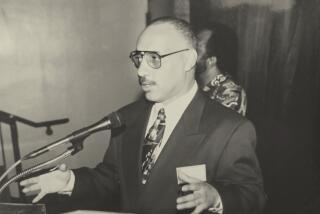He made the path better for others
- Share via
He fooled me. Or maybe I fooled myself because I did not want fate to unfold as it did.
I had thought that somehow, despite the disease that first appeared as two small dots on his scalp, the sheer force of his lively spirit would see Craig Chambers through.
I had hoped that Chambers, 59, who first appeared in this space in March after he walked the Los Angeles Marathon, would find a way to run right past cancer and keep going, just as he had done while jogging on what seemed like every fire trail on every low mountain in Southern California.
I had prayed that he would be a walking miracle, and that I would one day write of his comeback.
Sometimes, prayers are not answered. That happened here. Last Thursday, surrounded by family and loved ones at a Santa Monica hospital, Craig Chambers died.
You may recall that six months ago, Chambers allowed me to tag along while he made his way through the flat, hot course. He had run in every single L.A. Marathon, 22 in all, finishing each without trouble.
This year, however, suffering from Stage IV melanoma, he could only walk.
Chambers, who stood 6 feet, had piercing blue eyes and pale skin, was well aware of the odds. Aware that this would likely be the last time he would wind his way through the streets of Los Angeles, the city whose every corner he seemed to embrace.
For 26.2 miles that fine March day, we talked about shared interests: architecture, philosophy, politics, art, urban life and, of course, sports. He was an athlete, and an intellectual. His talk of Obama and Dostoevsky and bird watching helped me focus on something other than the fact that my quads were cramping and I walked, better yet, hobbled, in his shadow.
Chambers did not appear to like speaking about himself. He simply did not regard himself as someone to make a fuss over. This much I did glean: He had grown up Pacific Palisades. He had gone to UC Santa Cruz in the 1960s, had learned to see the world with open eyes there, and had started running during the jogging craze of the ‘70s.
He said he had already outlived the doctor’s timelines for his longevity. I gathered that he thought the melanoma was something he could end up conquering. If not, he wanted to hold the cancer back as long as possible because there was still so much life to live, so many topics to discuss, books to read and friends to encourage. “You can do this,” I heard him say, repeatedly, to struggling runners that day. “Just take things slowly.”
He spoke from experience. His feats are the stuff of legend. He ran more than 200 marathons and ultramarathons, all over the world. Once he ran 200 miles through Death Valley, followed that with a 10-mile swim, and then followed the swim with a 100-mile bike ride.
Along with his college roommate, Charlie Hoover, Chambers since 1980 had operated Phidippides, an Encino running shoe store. For five years during the ‘80s -- after he had given up his car, just to see what it would be like -- he ran 13 miles from his Santa Monica home to the shoe store in the morning, and then ran from work back to home every night.
Why did he stop? Kathy Kusner, his life partner since 1983, explained with a quote that is a window into how he approached life: “Well, I was telling him how great cars were, that a car was a good thing to have in L.A. Finally, the time came when he said, ‘Enough already, I’ve done this for five years, running 26 miles to and from work each day. That was fun, now let’s move on.’ ”
I kept tabs on Chambers over the months. I heard about how he kept walking, sometimes with his old running group. There were times when he fell to the pavement. Always, he got back up, vowing to continue, a smile on his face.
The cancer kept coursing through his body. Already, he had endured months of hard chemotherapy, undergone a brain operation, and surgeries to remove part of a lung, part of a liver, part of his lymph nodes. Now he was injecting himself daily with Interferon.
Still, in June, when he and Kusner met me for dinner at an Indian restaurant in Culver City, he was positive, even somewhat excited. Scans had shown the cancer was slowing. There was the possibility he could be part of new drug trials. He gave a quick update, smiling. Then he wanted to know about my trips to Asia, about my wife and her east-Indian roots, about what was going on at The Times.
Never did I hear him speak too long about himself. Never did I hear him complain.
“It wasn’t ‘Why me, why poor me?’ ” Kusner would say. “It was more like, ‘Let’s keep trying, I’m not doing that badly. I can go on.’ He kept an unbroken streak for not complaining, right until the end.”
Three weeks ago, we ate dinner once more, this time at the Playa Vista apartment he shared with Kusner. He was so weak he could barely stand. He had lost 30 pounds. His voice was a halting whisper. He asked me to read him a soon-to-be-published column. Sick as he was, when I told him the piece worried me, that I was not sure it was any good, he looked at me and smiled and said nothing but positive things.
It was time to go. I helped him to his feet and hugged him, knowing this might be the last hug, hoping and praying it would not.
Keep going, he told me. Just keep going.
Craig Chambers, I will, and so, surely, will your friends and family. In your example, in the graceful, powerful way you lived and died, we learned much.
Thank you.
------
A funeral service for Craig Chambers, open to the public, will be today at 3 p.m. at Forest Lawn Memorial Park in Glendale, 1712 S. Glendale Ave. A memorial, also open to the public, will be at Temescal Gateway Park’s Stewart Hall on Aug. 24 at 2 p.m.
--
Kurt Streeter can be reached at kurt.streeter @latimes.com.



